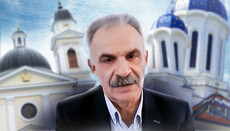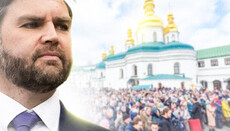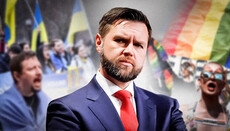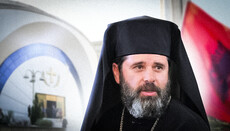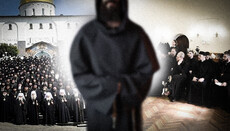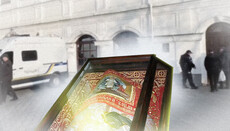Yelensky as govt’s crisis manager vs UN: What chief persecutor of UOC said
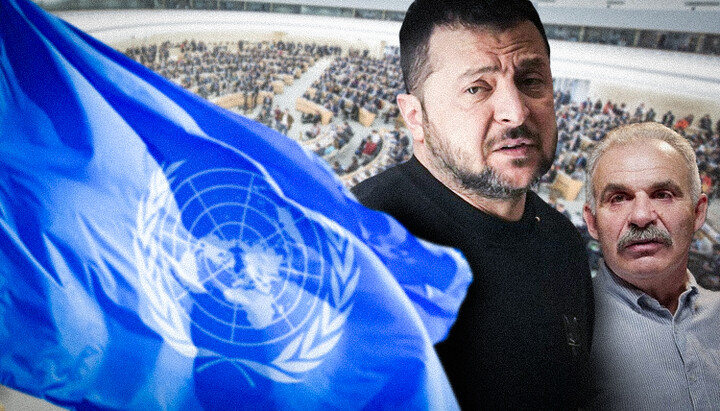
Viktor Yelensky, who once faithfully served the Communist Party, wrote antisemitic books and anti-religious articles, and is now Ukraine’s chief authority on religious matters, held a press conference.
On 13 January 2025, a press conference "Freedom of Conscience in Ukraine: Its Enemies and Defenders" was held at the Ukrinform platform. It was organised by the State Service for Ethnopolitics and Freedom of Conscience (DESS). The speakers were the head of DESS, Viktor Yelensky, and the "Metropolitan" of Crimea of the OCU, Pavel (Clement) Kushch. They spoke eloquently about how well Ukraine upholds the right to freedom of conscience, how democratic its laws are (including the law on UOC ban), and how gentle and tolerant DESS is towards religious organisations. However, to dispel any illusions about these claims, let us focus on the key points.
Where was the audience?
In reality, the press conference addressed critical issues for Ukraine and its people, such as the ban on the largest religious denomination in the country, legislative regulation of the religious field and violations of believers' rights on both sides of the front line. The event was announced in advance, but only a handful of participants turned up.
Was no one interested? Most likely, the reason is that people are tired of hearing repetitive statements from Ukrainian authorities about how perfect human rights, especially freedom of religion, are in the country. Nobody is keen on narratives claiming there are no religious persecutions or discrimination when reports of such incidents appear daily.
When a Russian passport becomes a sign of Ukrainian patriotism
In 2023, Zelensky stripped several UOC bishops of their Ukrainian citizenship. The reason was most often that they allegedly had a Russian passport, even if it was in the past. Yet, sitting next to Viktor Yelensky at this press conference was a person with a Russian passport, but no one seemed bothered. Back in 2020, his Russian passport was published online. Accounting for this fact, Kushch stated that otherwise, he would have lost his property.
Why was Kushch invited?
It became clear after "Metropolitan" Pavel (Clement) Kushch's speech why he was invited to the press conference. He was there to deliver one key statement: “We once again draw attention to the fact that the UN in Ukraine has not paid adequate attention to the situation of religious organisations in occupied Crimea, especially the Orthodox Church of Ukraine.”
This referred to the Report of the Office of the United Nations High Commissioner for Human Rights, published on 31 December 2024, which highlighted violations of the right to freedom of religion in Ukraine. The report also mentioned violations by Russia in the territories under its control, but this did not seem to bother Kushch or the Ukrainian Ministry of Foreign Affairs. Instead, they chose to criticise the UN with the argument: Look at Russia, not Ukraine. Russia is violating human rights, while “Ukraine continues to make every effort to protect and uphold religious freedom, adhering strictly to international law”.
Anyone daring to state unpleasant truths about Ukraine, however, is labelled a Russian agent. Recently, for instance, one of the UOC’s persecutors, MP M. Poturaev, commented: “Unfortunately, the UN is full of Russian influence agents, so we shouldn’t expect miracles from our diplomats.”
The UN response
Unfortunately for Viktor Yelensky and Pavel Kushch, a UN representative in Ukraine attended the press conference. She diplomatically clarified that the UN does not take sides but assesses the situation solely through the lens of international law: "The role of the UN Office for Human Rights in our report is to examine these issues strictly through the prism of international human rights law. In other words, we speak solely in dry legal terms."
She also dismissed allegations that the UN ignores violations by Russia, stating: "Our work involves monitoring the human rights situation throughout Ukraine, including, of course, the occupied territories [...] In our recent publications, we documented serious human rights violations committed by the occupying Russian authorities. These violations encompass many rights, including freedom of religion and belief."
However, the most striking point in the UN representative’s statement was her assertion that “international standards set a high threshold of requirements for imposing restrictions on freedom of religion” and that “national security is not a permissible basis for restricting freedom of religion under international and European law. The right to freedom of religion is given the highest priority over other rights.” The response to this statement was yet another round of declarations that Ukraine imposes no restrictions on religious freedom whatsoever.
Ordinary manipulations
The persecutors of the UOC, in defending their law banning the Church, have adopted a simple yet manipulative tactic: “We are not banning the UOC; we are banning the ROC. If the UOC has failed to prove to us that it is not part of the ROC, then it is to blame for its own prohibition.”
A quote from V. Yelensky: "The law (on UOC ban – Ed.) does not ban the Ukrainian Orthodox Church; it bans the activities of the ROC. [...] There is, of course, no mention of the Ukrainian Orthodox Church or any other religious organisation being banned in Ukraine."
But here lies the problem – the UOC cannot prove it does not belong to the ROC because the text of the law is drafted in a way that makes it impossible. For instance, the law states that if the ROC’s Statute claims the UOC is part of it, then it must be true. Yet, the fact that the Russian Constitution claims four regions of Ukraine and the Crimea are part of Russia does not lead V. Yelensky and other Church persecutors to conclude that this is indeed the case. And this is just one of many loopholes written into the law.
It is time to abandon these cheap manipulations and admit the truth: Ukraine’s Law "On the Protection of the Constitutional Order in the Sphere of Religious Organisations" has nothing to do with the constitutional order. Its sole purpose is to ban the UOC and force communities and monasteries to join the state-favoured OCU, taking all their property with them. The current Ukrainian authorities are doing everything they can to keep the OCU project afloat, and the law banning the UOC is merely a tool to achieve that goal. Join the OCU, and you’ll instantly transform from an FSB agent, Kremlin mouthpiece, collaborator, and traitor into a true patriot!
Another example of manipulation
P. Kushch said: “To claim that the new law restricts freedom of religion is to lie and conceal the crimes committed by the Ukrainian Orthodox Church as a Russian militarised structure in the occupied territories. The Metropolitan of Luhansk is also a temporary member of the Holy Synod for the autumn session of 2024-2025.”
Yes, it is possible that the head of the temporarily occupied Luhansk Eparchy is a member of the ROC Synod. Yes, it is possible that some clergy agreed to cooperate with Russian authorities, and some may even support them. But to label the entire UOC a "Russian militarised structure" on this basis is exactly what the UN, other human rights organisations and reasonable people are criticising: it is unacceptable to punish an entire multi-million-strong organisation for the actions of individual members.
When Russia occupied the Crimea in 2014, almost the entire staff of the SBU (Ukraine’s Security Service) defected to the enemy. Yet no one labelled the SBU a "Russian militarised structure", nor did anyone demand its prohibition.
Blatant falsehood
Several times in the speeches of V. Yelensky and P. Kushch, there were hints that the UOC bishops do not want to leave the governing bodies of the ROC and do not write relevant statements to the DESS. Yelensky claimed that if UOC hierarchs write such statements to him, there will be no complaints against them.
P. Kushch directly accused Metropolitan Onuphry, the Primate of the UOC, of being a member of the ROC Holy Synod. Yelensky went further, claiming not only membership but a senior position:
“For instance, Vladyka Clement mentioned that UOC representative Metropolitan Onuphry is a member of the Holy Synod of the Russian Orthodox Church. Indeed, according to tradition, the Kyiv Metropolitan is not just a member of the ROC Synod but the second-ranking member, following the Moscow Patriarch and preceding the Saint Petersburg Metropolitan.”
Yet Yelensky is well aware that on 28 September 2022, His Beatitude Metropolitan Onuphry sent a letter to DESS clearly stating that he is no longer a member of the ROC Synod. Moreover, this letter is publicly available on the State Ethnopolitics Service’s website.
The letter includes the following statement: “Now (following the UOC Council in Feofania on 27 May 2022 – Ed.), the decisions of the ROC Councils no longer serve as the basis for the activities of the UOC Council of Bishops. The Kyiv Metropolitan has ceased to be a member of the ROC Holy Synod. The Primate of the UOC is elected for life by the UOC episcopate without further blessing. Additionally, the Statute (of the UOC – Ed.) has removed the provision for commemorating the name of the Patriarch of Moscow and All Rus during services in UOC churches and monasteries.”
What more does V. Yelensky and his pseudo-experts need?
Why does the head of DESS tell blatant falsehoods about Metropolitan Onuphry remaining a member of the Moscow Synod?
Why does V. Yelensky fail to mention the existence of this letter? UOC hierarchs are required to submit such statements. Metropolitan Onuphry has done so – did this change the Ukrainian authorities' attitude toward him?
It is time to admit the truth: the authorities want to destroy the UOC, and no statements or compromises will help. The only way forward is steadfast faith and reliance on God's help.
Believe as you wish
V. Yelensky: "This law does not burden the conscience of believers because allegiance to the Moscow Patriarchate is not part of Orthodox doctrine. Once again, the Ukrainian state does not require the Ukrainian Orthodox Church, which is tied with the Moscow Patriarchate, to betray its Orthodox teachings, change its liturgical practices, switch to the new calendar or join another Church."
Indeed, Yelensky envisions the UOC simply ceasing to exist as an institution. Believers, however, may continue their faith privately, adhering to their calendar, praying as they wish, and so on. Yet, the Church of Christ is not a sect of flat-earth adherents. Christianity has existed in Ukraine for a thousand years. It represents a vast spiritual culture, ancient monasteries and churches, educational institutions, charitable organisations, hospitals, libraries, sisterhoods of mercy, shelters for the needy, and more. What Yelensky essentially says is: we will ban, confiscate and destroy all this, but you can keep believing as you like. No one will restrict you in that.
But "God in the soul" is not about Orthodoxy. Our faith is active. "Faith without works is dead" (James 2:17). And those works include all that has been accumulated over a millennium, which the authorities now seek to seize.
Utter cynicism is to expel people from a church they built with their own hard-earned money, ban their activities as a community, and then say: go ahead, believe and pray as you wish, you have every right. Yes, many communities are now forced to gather for liturgy in homes, but even this is often prohibited. They face threats of violence, arson and even murder. These acts are, of course, not carried out by Yelensky or other government officials but by various nationalist radicals and activists incited against Christians by the lies propagated by Ukrainian authorities, media and social networks.
The UOC clergy’s dilemma: the OCU or the Army
When asked whether the exemption from mobilisation for clergy would apply to the UOC clergy, Yelensky actually replied that it would not. The order determining who qualifies as clergy will be issued by DESS, which he heads. Yelensky has already stated that the order will stipulate that the clergy serving in organisations "affiliated" with the ROC will not qualify.
"Obviously, one criterion will be the absence of affiliation with a banned religious organisation in Ukraine. Another will be the validity of the name, meaning that the statute in terms of the name remains valid," said Yelensky.
Yelensky has already made up his mind about affiliation. In his view, the UOC is still part of the ROC. The criterion regarding the name refers to the law requiring the UOC to rename itself as the ROC in Ukraine – again based on the ROC's claim in its statute that the UOC is part of it. Therefore, there is no chance for the UOC. This is yet another strong lever the authorities hope to use to coerce as much of the clergy as possible into joining the OCU: join the OCU and receive exemption; remain in the UOC and face the frontline.
Adding to the cynicism is the fact that UOC clergy cannot serve as chaplains. This creates an absurd situation: their presence in the AFU as chaplains is considered a "threat to national security", but their presence as soldiers (in violation of their priestly vows) is perfectly acceptable. And if we were to believe the propaganda narratives that all UOC clergy are "FSB agents in cassocks", imagine how many "agents" Yelensky could plant in the AFU!
The procedure for enacting the law on ban
When asked whether DESS has begun issuing directives to religious communities as provided by the law on UOC ban, V. Yelensky responded that it has not yet started. He explained what regulatory acts the Cabinet of Ministers must adopt for this to proceed.
V. Yelensky: "The first is the procedure for issuing directives, the second is the procedure for granting permission for relations with a banned religious organisation, and the third concerns the ideology of the 'Russian World'."
One of the most controversial provisions of the law banning the UOC is that this prohibition could be triggered by the dissemination of the ideology of the "Russian World". Almost anything could fall under this definition – icons of the Mother of God of "Russian" origin, churches named after Russian saints, and more. V. Yelensky sought to clear the doubts, stating that nothing of the sort would occur.
V. Yelensky: "As you may recall, there was much speculation about a provision in the law allowing DESS to petition the courts to cease the activity of a religious organisation if it repeatedly disseminated the ideology of the 'Russian World.' [...] For example, some have asked whether naming a chapel or church after Alexander Nevsky constitutes propaganda of the 'Russian World' as Alexander Nevsky could be considered a symbol of that ideology."
From the tone of Yelensky's remarks, it appeared that no one would be banned for such reasons. Responsibility would arise only in cases where "propaganda of the 'Russian World' promotes ideas of undermining Ukrainian statehood, culture, or identity, calls for changes to Ukraine's territorial integrity, and so on."
Here, V. Yelensky is beating around. Firstly, one can recall that the persecution of the Church by authorities began with an innocent spiritual hymn “Theotokos, Mother of Light, Love, and Goodness”, which included the words, "Mother Rus’ awakens." These words carried no implication of undermining Ukrainian statehood, culture or identity. However, following the scandal surrounding this hymn being sung in Kyiv-Pechersk Lavra in late 2022, the SBU launched a large-scale campaign of raids and interrogations in UOC monasteries and eparchial administrations. This incident also prompted a meeting of the National Security and Defence Council and a decree from President Zelensky initiating the repressive campaign against the UOC. Thus, even a hymn could lead to prohibition.
Additionally, the law banning the UOC presumes that anyone, even without the clergy's or hierarchy’s knowledge, could spread the "Russian World". This makes it easy to plant a provocateur in a church or monastery to record statements on camera that align with DESS's predetermined narrative.
Access to a UOC temple
Another manipulative claim is that the UOC is not banned, and anyone can enter its churches. V. Yelensky mentioned American journalist Tucker Carlson, who once said that President Zelensky was persecuting the Church. According to Yelensky, this statement bears no relation to reality. To support his claim, he stated: "If we leave this building now, we can easily enter the Ukrainian Orthodox Church under the jurisdiction of the Moscow Patriarchate."
These are fine words but clearly not true. Yelensky seems to have forgotten that no believers have been allowed into the Kyiv-Pechersk Lavra or its caves since 10 August 2023. Authorities barred access. Nor can one visit the Tithe (Desiatynnyi) Monastery in Kyiv or St. Volodymyr’s Church in Lviv because the authorities demolished them with bulldozers. Hundreds of churches across Ukraine remain inaccessible: illegally seized, locked because no one goes there. What about all this? Does it "bear no relation to reality" as well?
Here, by the way, P. Kushch in his speech at the press conference mentioned the destruction of OCU churches in Crimea: "You surely recall the events of May 2023, when the cathedral in Simferopol was destroyed, and the demolition of the church in Yevpatoria on Ukraine’s Independence Day in 2024 was a cynical act of vandalism."
Why does he remain silent about churches destroyed by Ukrainian authorities? Why doesn’t he call these actions "acts of vandalism" as well?
Conclusions
This press conference was far from an objective assessment of the situation surrounding the UOC. Instead, it served as further evidence of the Ukrainian authorities’ ill intentions toward the UOC, perhaps even as material for future legal proceedings, which will hold accountable those responsible for today’s violations of human rights in Ukraine.
